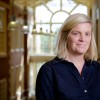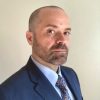Over the past academic year, the first cohort of the Inclusive Leadership Development Program (ILDP) has been meeting monthly. The cohort was made up of twenty people from across Wake Forest, after having been nominated and accepted to join the group. Rodrigo and Rebecca were accepted to participate in this first cohort.
Rodrigo
I was very impressed with how thorough the Inclusive Leadership Development Program (ILDP) was. It included instruction on critical topics in the area of leadership, practical group exercises, multiple leadership evaluations, and opportunities to network.
Each session covered important aspects of organizational leadership. Throughout the program, we learned strategies on how to communicate effectively in a multicultural environment; how to use boundary spanning strategies to enhance collaboration, empowerment, and inclusive leadership while fostering psychological safety; and how to seek out, encourage, and manage different perspectives, especially when these perspectives differ from our own.
There were two sections I found particularly impactful: The first one was one on the topic of Resilience. In this section, we discussed how to effectively manage our own emotional responses when facing challenges and/or change. We also explored the relationship between stress management, mindfulness, and resilience. The second section was on the topic of Learning Agility and Curiosity. In this section, we explored the importance of leaders being comfortable managing different perspectives to help their team members develop a sense of trust, belonging, and ownership.
Although this program offers critical content, relevant strategies, and thorough and honest assessment, the most important aspect of the program, in my opinion, is the opportunity to interact with individuals from different areas of the University who, having similar responsibilities, experience challenges that are almost identical to the ones we face. Being able to develop a network of colleagues with similar responsibilities in different areas of the University to discuss strategies, bounce ideas, or simply vent, is an invaluable resource.
Rebecca
We started the experience by developing our “key leadership challenge” which was a professional challenge that we would work on throughout the whole experience. Once we met together, we were sorted into groups of four; these groups would remain together throughout the program. This was a wonderful opportunity to get to know new people, but also develop a strong relationship and understanding of our work, our successes, and our challenges.
Sessions included Self-Awareness, Communicating Effectively, Thinking and Acting Systemically, Influence, Resilience, Learning Agility and Curiosity, Polarity thinking, and Boundary Spanning. We took quizzes, and tests, and questionnaires about Intercultural competence, Intercultural Development Plan, Intercultural Conflict Style Inventory, Clifton Strengths, Change Style Indicator, a 360 feedback report, and more!
This was a very valuable experience and I highly recommend anyone interested to apply. The group was led by Dr. Malika Roman Isler, Dr. Bill Gentry, Li Miles, and was coordinated by Eliese Ashline. In addition, we had many guest speakers and facilitators from WFU and the Center for Creative Leadership in Greensboro. The topics were engaging, thoughtful, and timely- allowing us to build our knowledge and apply it to our key leadership challenges. Rodrigo’s summary echoes some of my key takeaways, but if you’d like to have a one on one conversation about ILDP, please don’t hesitate to reach out!


4 Comments on ‘Inclusive Leadership Development Program (ILDP) 2024-2025’
Congratulations on completing such an instructive and varied program!
Thanks, Rodrigo and Rebecca, for sharing more about ILDP and for being part of the inaugural cohort!
Awesome!
Congrats, Rebecca and Rodrigo! I’m glad you had a wonderful experience with this program. Thanks for participating and sharing your insights.